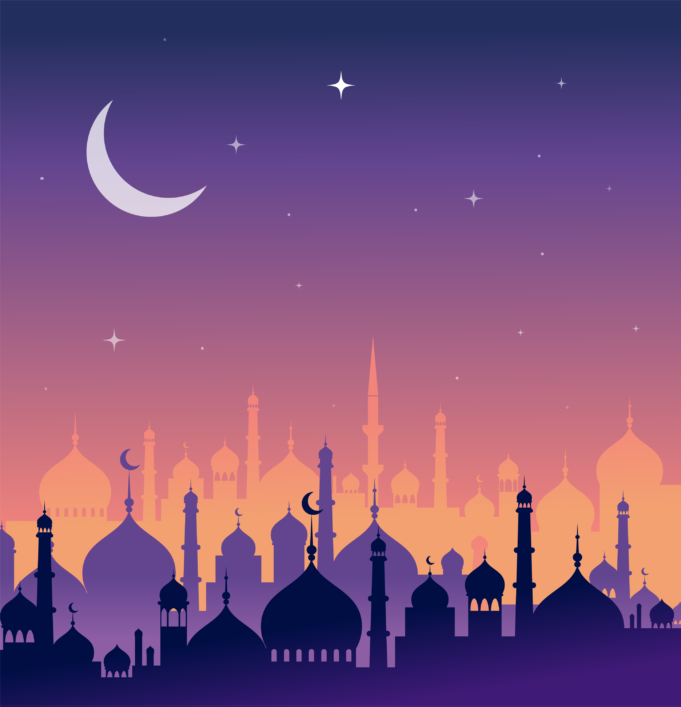“He indeed is successful who purifies himself, And remembers the name of his Lord, then prays.”—Holy Qu’ran 87:14-15
‘Id Mubarak! This Holy Month of Ramadan, we pray that we as Believers have gained valuable lessons that strengthen our desire to carry out the spirit of this Holy Month throughout our life. The Believer who is intent upon the renewal of self has found this Holy Month to be a gift from Allah (God).
As Allah intervenes in our affairs, we must understand the status of our heart. For Allah (God) has stated that He is closer to us than our very own life, jugular vein. Have we seen the reflections of ourselves throughout this past Holy Month? Have we been acquainted with self-restraint?
Will those chains still lock up those demons, devils of self throughout the rest of the year? These questions we must ask ourselves, dear Believers, to gauge if we are denying the favors that Allah has bestowed upon us. Hopefully, we have come out of this Holy Month of Ramadan completely renewed.
We must strive to keep the spirit of this the Holy Month throughout the year and our lives. We have not had a true impact on “self” if we are not yearning for that which we have gained during this Holy Month. If we are not on guard and thankful to Allah for His favors, trials, and blessing during this past month, we would have gone throughout Ramadan without attaining its true lesson.
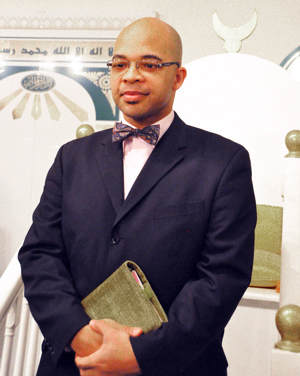
Aspects of the fast, which deepen our expression of the noble human values such as, empathy for the underprivileged, promotion of charity, heightened acts of devotion, strengthening of our steadfastness and patience—and the building of our Will power—should all be benefits that sharpen our regard for the things we often times take for granted. Our gratitude and thanks to Allah and all that He has granted to us bring about happiness and life should be more deeply regarded as a result of the fast of the believing men and women.
After celebrating the completion of the Holy Month of Ramadan, a full month of Fasting and devotion, we are grateful to have commemorated one of the great ‘Id festivals that sealed our fast with congregational prayer service and the feeding of the impoverished- or Sadaqat ul-Fitr. Although in celebrating in our homes instead of major gatherings, we this year reimagine our celebrations in nearness to our families and those in our households. If we are alone, we celebrate with the entire Muslim Ummah Victory over our base desires.
This major celebration of the Breaking of Fast, which is known as ‘Id al-Fitr—The Festival of the Renewal—or Breaking of the Fast signifies our Return to our Original Nature. This victory is our return to our inborn, or innate, disposition at birth and the Origin of Creation itself. The Hon. Elijah Muhammad writes on pg. 138 of “Message to the Blackman in America,” daily prayer “… is a help to the establishment of healthy social relations.
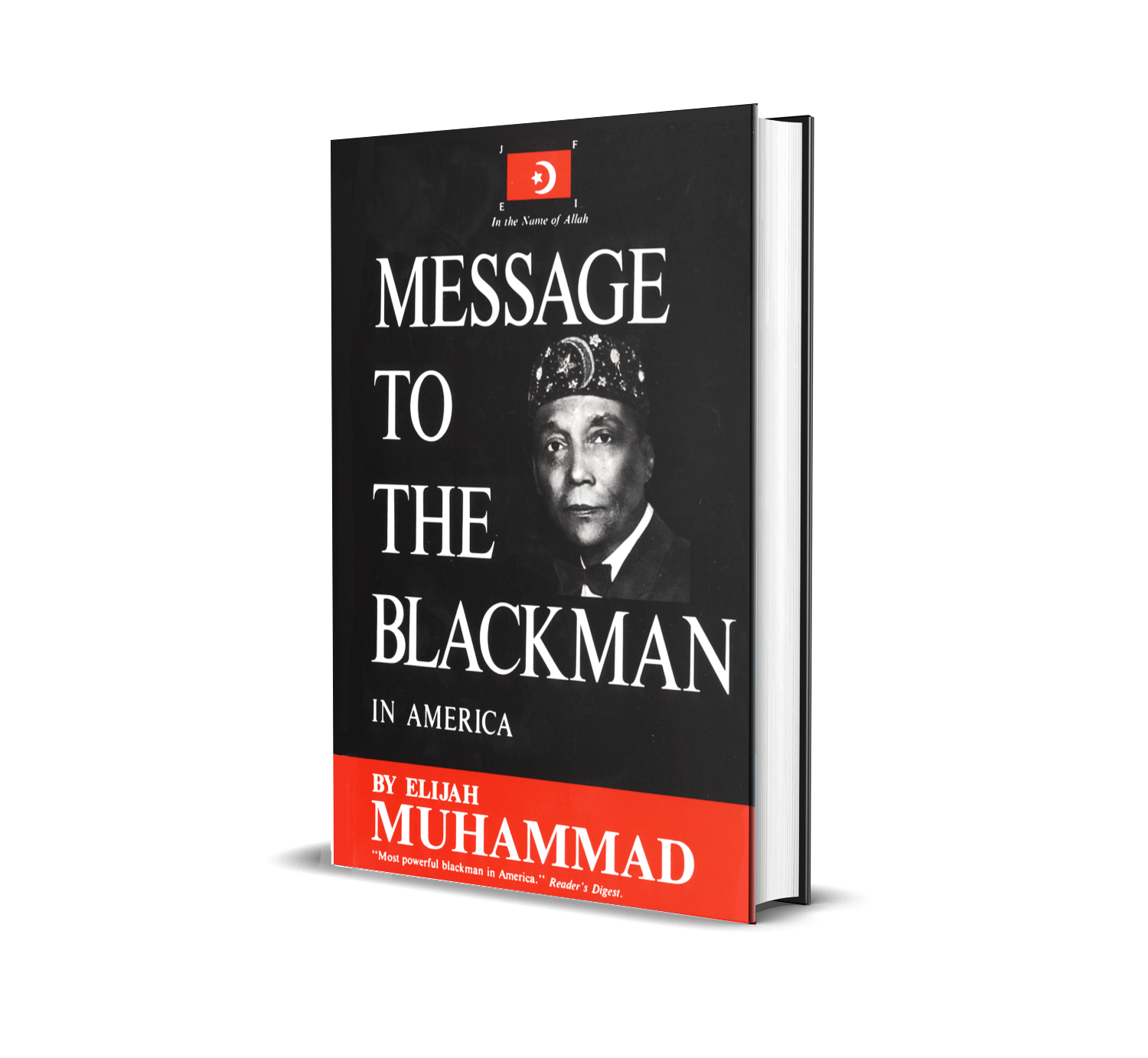
In the daily service these relations are limited to a narrow circle, i.e., to members of the same neighborhood. But the circle becomes wider in the weekly Friday service which gathers all Muslim members of a particular locality and becomes still wider in the two great “Id” gatherings. … Thus, prayer promotes social relations between the different sections of the Muslim community. Far more important than this, however, is the leveling of social differences brought about by means of congregational prayer.
Muslims throughout the world celebrate this joyous occasion over a minimum of three days through the exchange of gifts, engagement in festive activities, and service to the neediest in society. It is a rejuvenation of the faith and the practice of our religion that creates a stronger bond between the Muslim, his Lord and the believing family. On this day Muslims show their real joy for the health, strength and the opportunities of life, which Allah has given to us to fulfill the ultimate establishment of a New Reality for Self and Society.
“Nay, those who are unjust follow their low desires without any knowledge; so who can guide him whom Allah leaves in error? And they shall have no helpers. So set thy face for religion, being upright, the nature made by Allah in which He has created men. There is no altering Allah’s creation. That is the right religion—but most people know not—Turning to Him; and keep your duty to Him, and keep up prayer and be not of the polytheists.”—Holy Qur’an 30:29-31
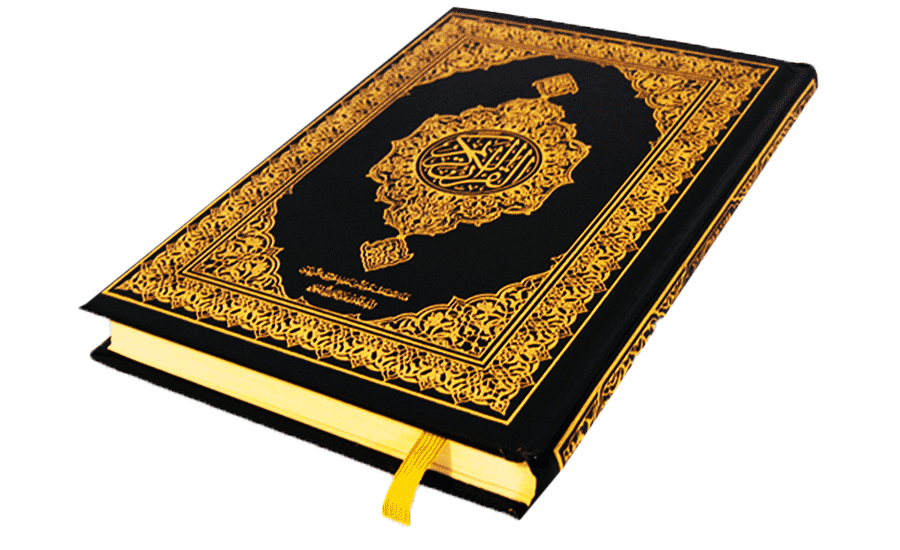
“Spiritually, He says that your own self (referring to you) is a righteous Muslim.”—Honorable Elijah Muhammad. Allah (God) says in the Holy Qur’an that man is created in the best of molds in a nature of excellence and submission to His Will, as the crown of creation. Allah states in fact, that man and all of creation is created in the nature of Islam, which is the universally innate “color” of Allah’s (God’s) Reality.
“(We take) Allah’s colour, and who is better than Allah at colouring, and we are His worshippers.”—Holy Quran 2:138
Therefore one “colored” by ugly behavior, wrongdoing, and wickedness is far from the original state of the self—other than self. What we devote ourselves to or worship we begin to reflect or assume the Character of! The Arabic word “Abd” means to receive the impression of that which you serve—or to worship.
It is through the natural guidance instilled within our original disposition—the fiber of our existence that is termed in the Holy Qur’an as fitra, the Natural desire to do good or be innocent; A quality or feature regarded as a characteristic or inherent part of someone or something.
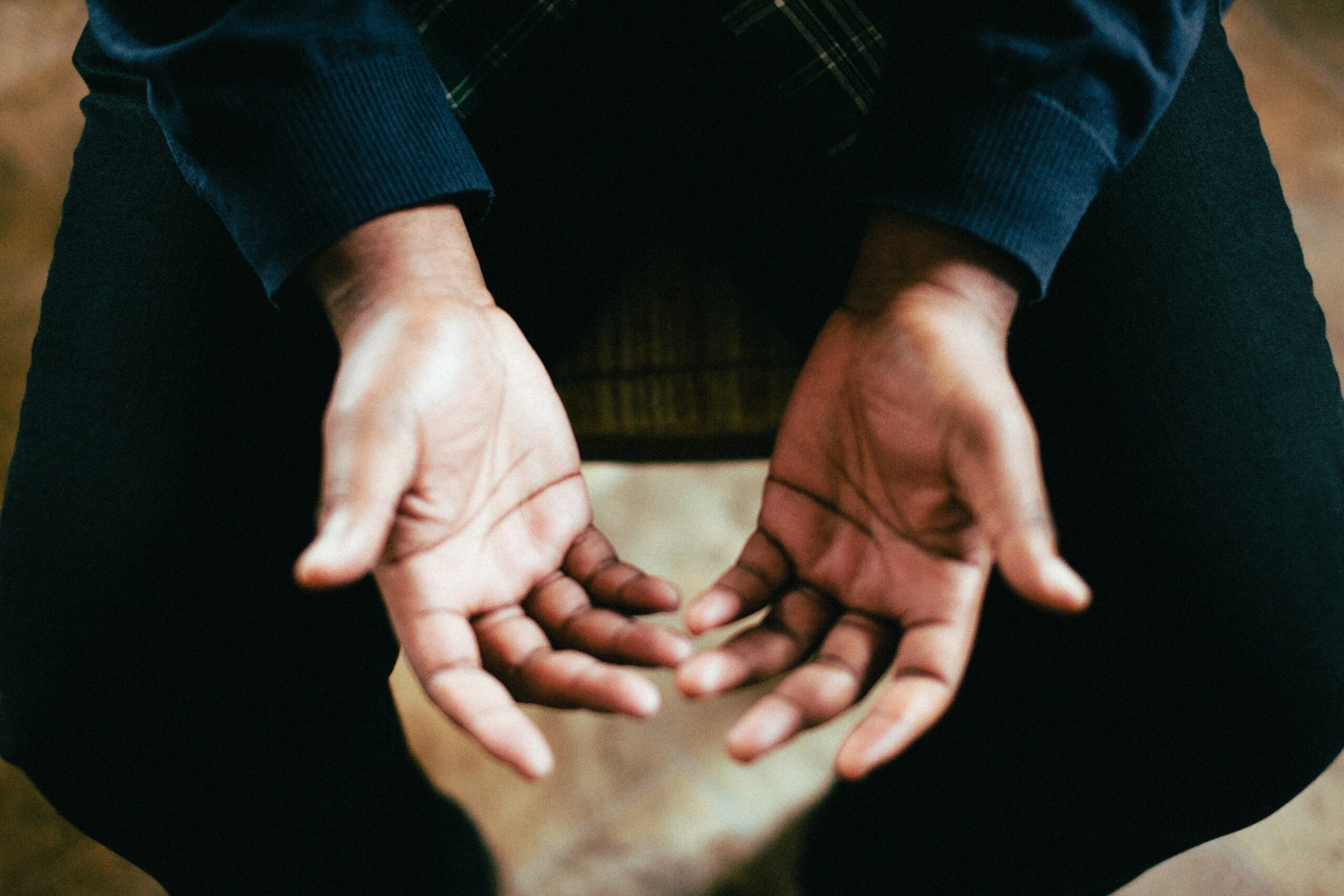
Who is the Original Man? What is his own self? His own self is a righteous Muslim. “Islam is actually our religion by nature. Allah is the proper name for God … you should remember that you have a great offer made to you in the words, ‘Accept your own.’ To accept your own means yourself and your kind, your God, Who is of you and you are of Him,” the Honorable Elijah Muhammad writes in “Message to the Blackman.”
To accept your own is to reclaim your original or natural self as created by Allah (God) and is accomplished by the surrender or submission of self by embracing the reality of our origin and nature. Every Divine trait or character is part of the original nature of humanity.
Let us consider reflection, meditation and study on the Divine Attributes or Names of Allah as a method by which we may engage in self-reflection and practice self-correction by purifying ourselves of ugly immoral behavior for the natural character traits we have been Blessed to assume in our process of spiritual development and growth.
In Islam we commonly name our children or assume the Names of Allah (ta’alaa) as our own. Kareem, Sultan, Malik, Ali, Azeez and so on. It is through this connection to the Originator of the Heavens and the earth that we must seek our return to Him by His Attributes.

The basic form of the self-concept remains the same for all people, however the specific content changes. The mental framework centering around the self which helps us to organize information gathered through our experiences and interactions is more complex, then the question of “Who am I?” Everything a person remembers, knows, and can imagine about themselves is also part of this complex mental framework. This mental framework or state of mind also helps guide our personal behavior.
“Do not act like those who have forgotten about Allah, so that He has caused them to forget themselves.”—Holy Quran 59:19
If one understands identity to mean a comprehensive set of beliefs and practices that guide our lives and provides a stable sense of self, it becomes quickly obvious that the most critical element in this is the belief system. In Islam beliefs direct practices. The Honorable Minister Louis Farrakhan teaches, “A Muslim is what a Muslim does.” The choices we make and the actions that we undertake illustrate the true nature of who we are.
The stronger the Presence of Allah (God) is in our lives through the contemplation and remembrance of Him, the stronger our character will become adorned by right action in the Spirit or Character of Allah (God). We must study Self … Fasting makes us more acquainted with what drives or rules our being—If we forget Allah (God), we lose our sense of self.

The matter of identity is straightforward—it forces us to look into ourselves and ask ourselves who we are and seek The Truth of self. Our personal identity or sense of self as part of a community or group is the most fundamental influence in our actions or inactions, aspirations, visions, goals and also our success or failures. “He who knows himself, knows his Lord,” Prophet Muhammad (PBUH) stated.
The Honorable Minister Louis Farrakhan stated, “Abraham is always mentioned in our prayers and the Qur’an says he was neither a Christian nor a Jew. He was an upright man and not one of the polytheists, so if during the month of Ramadan we want to be more like the man or the Prophet who is considered the friend of Allah, then uprightness in word, in deed, in spirit, is demanded of us and sitting down any worship of anything that is other than Allah—that is what the training is about.
My life is for Allah, my prayers, my sacrifice, my life, my death is all for Allah. He is the exclusive object of my worship. So, if I could do it in these thirty days I could do it in 365 and ¼ days. I am setting my mind for whatever I am going to face in terms of my seeking of justice or else. My mind is not on frivolity, my mind is on spending my life if necessary to stop tyranny and oppression.” Set your face for religion being upright the nature made by Allah in which He has created.
We see ourselves in many ways vainly fighting the tyranny of our own low desires but not having the strength to fight the tyranny of the enemy externally thereby becoming ritualistic as a Muslim family. The Fast becomes ritual and loses its real meaning or value when we do it because we think we are supposed to do it. The prayer and the actions of belief become ritualistic, and the ritual is only getting us into the practice of something much deeper than a ritual.
It is related that the Prophet (peace and blessings be upon him) said: Whoever fasts during Ramadan with faith and seeking his reward from Allah will have his past sins forgiven. Whoever prays during the nights in Ramadan with faith and seeking his reward from Allah will have his past sins forgiven. And he who passes Lailat al-Qadr in prayer with faith and seeking his reward from Allah will have his past sins forgiven (Bukhari, Muslim).
“Surely Allah changes not the condition of a people, until they change their own condition.”
—Holy Quran 13:11
As we strive for renewal, let us in this hour, celebrate the achievement, insha’Allah, a completed 30 days of fasting. We are now elevated, experiencing the heights of paradise and the victory over the evils of self! The Honorable Elijah Muhammad taught us to “Set ourselves in heaven at once”. Which of the favors of Allah would you deny?
(Sultan Rahman Muhammad serves as Student National Imam of the Nation of Islam and resident Imam of Mosque Maryam National Center, Chicago. Visit NOI.org/ramadan @ImamSultanM, or email: [email protected]












